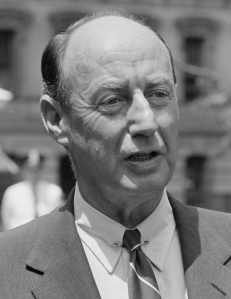For much of this country’s history, America’s voters have elected Presidents with some history of military service. Until President Clinton’s election in 1992, every successful candidate for the White House since World War II had worn a military uniform. But for a down-cycle economy in 1992 and a thriving economy in 1996, it is unlikely Mr. Clinton would have broken the trend.
Of our 44 Presidents, twelve have held the rank of general, with ten having seen battle action: Washington, Jackson, William Henry Harrison, Taylor, Pierce, Grant, Hayes, Garfield, Benjamin Harrison, and Eisenhower.
Imagine two of the unsuccessful candidates who ran against the heroes of their day, former New York governor Horatio Seymour, who ran against General Ulysses S. Grant in 1868, and Illinois Governor Adlai Stevenson, who challenged General Dwight Eisenhower in 1952 and 1956. This article is limited to a discussion of Seymour. I will talk about Stevenson in my next article.
Seymour had served two terms as governor of New York. In 1863, he had questioned the constitutionality of the Union’s conscription laws, largely because he believed they were tilted in favor of Republican congressional districts. During the New York City draft riots in July, 1863, he had addressed some demonstrators as “my friends.” The riots ultimately were extinguished by veterans of the Battle of Gettysburg.
At the 1868 Democratic Convention, Seymour reluctantly accepted the nomination on the 22nd ballot. In the election campaign that followed, Seymour and his Vice-Presidential running mate, former former Union General Francis Blair, pursued a “white man’s” platform, arguing that the Republicans’ reconstruction policies should be nullified. President Johnson had narrowly escaped conviction in his impeachment trial only a few months earlier. His impeachment had been due in large part to his resistance to reconstruction legislation (although the principal pretext for impeachment had been Johnson’s non-compliance with the highly controversial, and certainly unconstitutional, Tenure of Office Act). Americans had just suffered through four years of civil war and three years of Johnson and the Congress at one another’s throats. And Seymour thought they wanted more of the same?
Grant, in contrast, followed the tradition of the age, not campaigning at all (Can you imagine?), but instead spending much of his time either in his hometown of Galena, Illinois, or on vacation on the Great Plains. Rather than stirring the pot, he avoided making speeches. His campaign managers exhorted the populace to “[l]et us have peace.”
Seymour did win over 47 percent of the popular vote, but Grant won the electoral-college vote in a 214-80 landslide. Seymour won New York, New Jersey, Delaware, Maryland, Kentucky, Oregon, Louisiana and Georgia. Three Southern states – Virginia, Mississippi, and Texas – had not been readmitted to the Union, and therefore did not participate in the election.
As I stated earlier, Grant was the hero of his age. He had “conquered the peace,” bringing an end to four bloody years of conflict. It is unlikely any Democratic candidate could have beaten Grant, particularly when many Americans believed the Democratic Party had brought on the war with their contentious 1860 Presidential nominating conventions in Charleston, South Carolina, and Baltimore, Maryland. Republicans waved the “bloody shirt.” Americans were not going to turn the White House over to the party they deemed responsible for over 600,000 American lives.
Sources:
- McPherson, Ordeal by Fire, 3rd Edition, (McGraw-Hill 2001)
- Bernstein, New York Draft Riots, (Oxford University Press 1990)
- Brands, The Man Who Saved the Union, Ulysses S. Grant in War and Peace, (Doubleday 2012)


